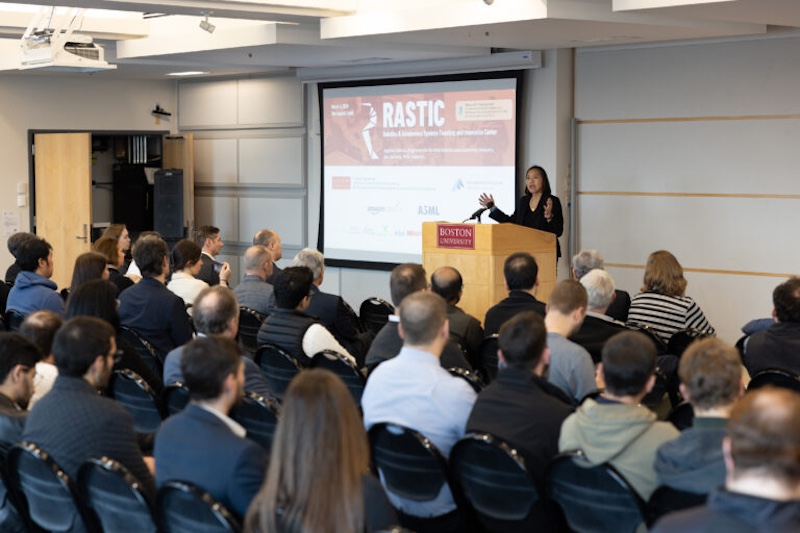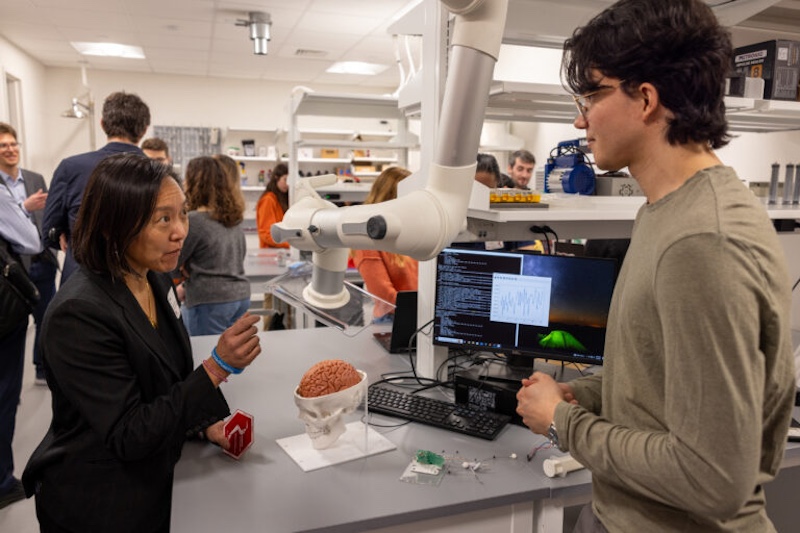Boston University celebrates grand opening of its Robotics & Autonomous Systems Teaching & Innovation Center
An autonomous robot cut the ceremonial ribbon at the grand opening of Boston University’s $8.8 million Robotics & Autonomous Systems Teaching & Innovation Center (RASTIC).
Held March 4th, the grand opening included talks from state, industry and university leadership; facility tours; and 16 student demonstrations of robotic projects, spanning smart cities, medical robotics, drones, autonomous driving, smart home applications, and more.
In development over the past year, RASTIC brings together academia and industry to develop the next-generation competitive robotics and autonomous systems workforce.
The state-of-the-art laboratory and industry-aligned, hands-on interdisciplinary training and education allows students to design, build, and test all kinds of robots, from simple consumer ’bots to GPU-fueled, AI-powered systems.
The Center was founded in 2022 with a $8.8 million capital investment from the Innovation Institute at the Massachusetts Technology Collaborative (MassTech) and Boston University, with support of MassRobotics, and industry partners AETLabs, Ava Robotics, Boston Scientific, GreenSight, Intel, and Ubiros.

At Monday’s inaugural celebration, Boston University Provost Ad Interim Kenneth Lutchen led opening remarks and introduced Commonwealth of Massachusetts Secretary of Economic Development Yvonne Hao who initiated the ribbon cutting.
Speakers also included MassTech Collaborative Executive Director Carolyn Kirk; Amazon Robotics Chief Technologist Tye Brady; ASML Senior Director of US Development & Engineering Spencer Farland; College of Engineering Dean Ad Interim Elise Morgan; and RASTIC Director Kenneth Sebesta.
Introductions were led by Ioannis (Yannis) Paschalidis, RASTIC principal investigator, director of Hariri Institute for Computing, distinguished professor of engineering (ECE, SE, BME), and founding faculty of Boston University’s Faculty of Computing & Data Sciences.

Located on Boston University’s Charles River Campus, the 2,000 square foot RASTIC facility features areas dedicated to AI and soft robotics development, device construction, an arena for robot testing, and a miniature city to further autonomous vehicle research.
At RASTIC, students will learn by doing, partnering with companies to provide real world robotics solutions. RASTIC will also serve as a summit space for lectures on robotics by innovators and thought leaders.
Photos by Mike Spencer

